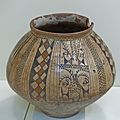Hayasa-Azzi facts for kids
Hayasa-Azzi, also known as Azzi-Hayasa or Haisa, was the name of a group of people and the area where they lived a long, long time ago. This region was located in what is now eastern Anatolia, which is part of modern-day Turkey. Specifically, it was north of the Euphrates River and south of another area also called Hayasa.
Historians and archaeologists are still trying to learn more about the Hayasa-Azzi people. It's a bit of a mystery because we don't have many written records from them. This means we don't know what language they spoke! It could have been an Indo-European language (like English or Spanish today), or perhaps a Hurrian language, which was spoken by other ancient groups in the region.
Contents
Who Were the Hayasa-Azzi?
The Hayasa-Azzi were a significant group in the ancient Near East, especially around the 15th to 13th centuries BC. They formed a kind of confederation, which means several smaller groups or tribes came together to act as one. This made them a powerful neighbor to other big kingdoms of their time, like the Hittite Empire.
Their Place in History
Even though we don't know much about their language, the Hayasa-Azzi are important because they interacted with the mighty Hittites. The Hittites were a very strong empire in ancient Anatolia, and they often had conflicts or made treaties with their neighbors. The Hayasa-Azzi were one of these important neighbors, and their story is often told through the records left behind by the Hittites.
What We Know From Neighbors
Most of what we understand about the Hayasa-Azzi comes from the writings of the Hittites. These ancient texts describe battles and agreements between the two groups. Sometimes, the Hayasa-Azzi were allies with the Hittites, and other times they were enemies. These interactions show that the Hayasa-Azzi were strong enough to challenge or negotiate with a major empire.
Life in Ancient Anatolia
Imagine living in a time when there were no cars, phones, or even proper roads! People in ancient Anatolia, including the Hayasa-Azzi, lived off the land. They were likely farmers, raising crops and animals. They also probably had skilled craftspeople who made tools, pottery, and weapons.
Daily Life and Culture
While specific details about the Hayasa-Azzi's daily life are scarce, we can guess a lot from what we know about other ancient cultures in the region. They likely lived in villages or small towns, with houses made of mud brick or stone. Family and community were probably very important, and they would have had their own unique traditions, stories, and beliefs.
The End of the Hayasa-Azzi
The Hayasa-Azzi confederation eventually disappeared from historical records around the 13th century BC. This was a time of great change and upheaval in the ancient Near East, often called the Late Bronze Age collapse. Many powerful kingdoms and groups declined or vanished during this period. The reasons for their disappearance are not fully known, but it could have been due to wars, climate change, or other major disruptions.
Images for kids
See also
 In Spanish: Azzi-Hayasa para niños
In Spanish: Azzi-Hayasa para niños
 | Chris Smalls |
 | Fred Hampton |
 | Ralph Abernathy |



